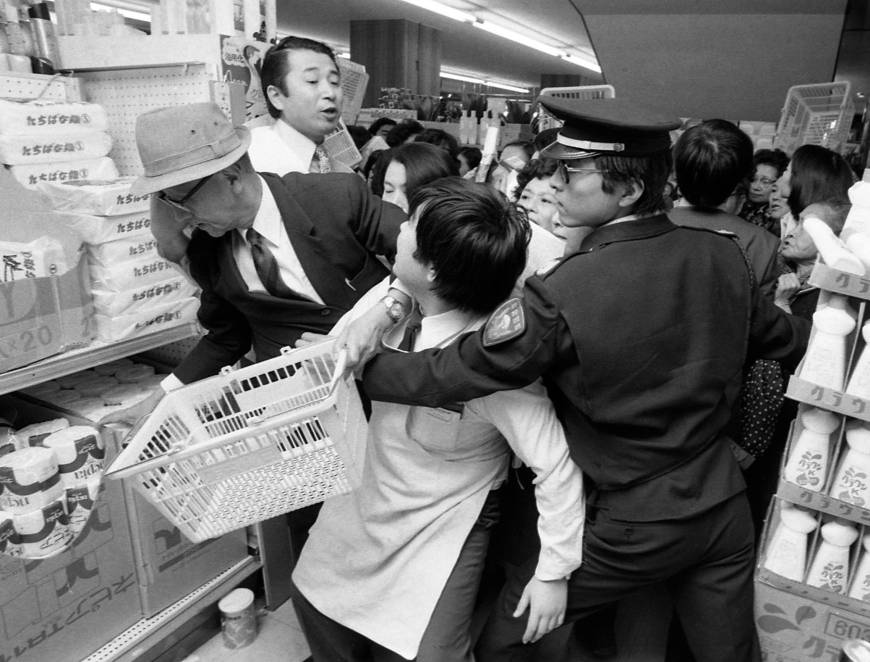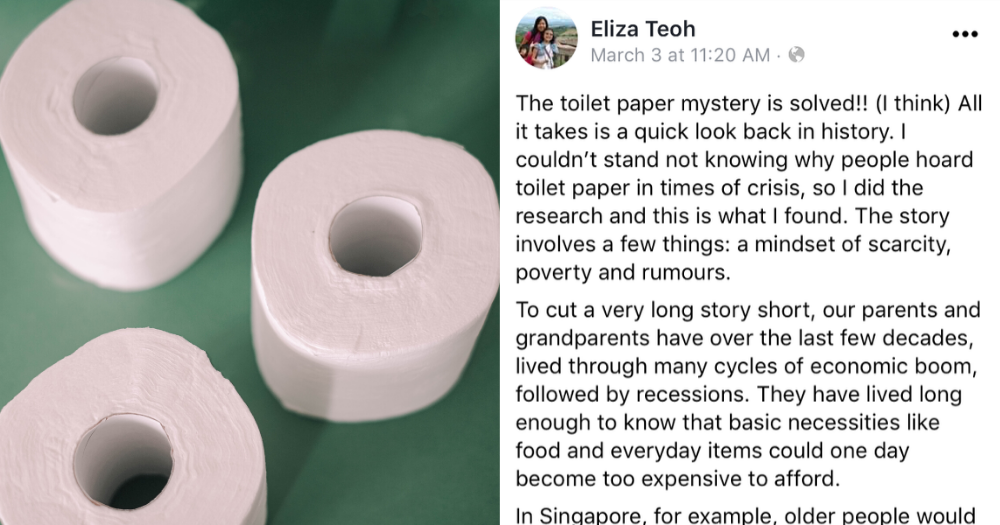By now, we are all familiar with the narrative of panic-buying and hoarding that has come with the Covid-19 crisis.
One interesting phenomena that has been observed, both here and overseas, is the pattern of toilet paper being one of the hottest commodities to be flying off the shelves during this time.
And if you're like us, you might wonder, why is that the case? One woman in Singapore was curious enough to do some research to find an answer to this intriguing question.
Scarcity mindset developed by historic events
In a Facebook post on Mar. 3, Eliza Teoh, a children's book author and former journalist, explained the historical significance of toilet paper hoarding.
She pointed out that older generations have lived through many cycles of economic expansion and recession, and that from those experiences, they understand that basic necessities such as food and everyday items could become priced beyond their reach.
Here in Singapore, she added, our elders recall the food rationing that occurred during the Japanese Occupation in the 1940s, as well as the scarcity caused by Singapore's independence from Malaysia.
Between the 1950s and 1970s, Teoh wrote, food production rose greatly, but bad weather in 1972 caused food prices to again rise and become unaffordable for the poor.
All of these global situations, she says, are what caused people to develop a mindset of scarcity, which in turn made them anticipate future food shortages.
Rumour sparked panic-buying
Then, in 1973, the Arab oil embargo occurred, enacted by Arab oil producers to protest American military support for Israel during the Arab-Israeli War.
The embargo disrupted not only the global oil supply, but also food production and that of other everyday items, wrote Teoh.
What happened next, she added, was due to the scarcity mindset mentioned earlier.
After a flyer by a supermarket in Osaka, Japan "gave the wrong impression" that toilet paper was running low, people in Osaka "stampeded" to buy it before the prices increased.
Footage of the incident then sparked similar situations elsewhere in Japan, and many people were injured, wrote Teoh.
Here's a photograph she included of the toilet paper panic-buying.
 Image from Facebok / Eliza Teoh. Original copyright unknown.
Image from Facebok / Eliza Teoh. Original copyright unknown.
News spread to the U.S., but things were under control, despite people being worried, until an American television host and comedian made a joke about it on Dec. 19, 1973 on his popular late-night talk show, The Tonight Show.
You can watch a clip of him joking about the toilet paper shortage here:
"You know what else is disappearing from the supermarket shelves? Toilet paper. *laughs* You're gonna laugh now. There is an acute shortage of toilet paper in the good old United States", he said to his audience.
The joke, of course, sparked a toilet paper-buying frenzy, with prices rising and toilet paper became a prized commodity, even used for bartering and trading.
The panic surrounding toilet paper lasted two months until Feb. 1974, when people eventually realised there was actually no shortage, and Carson issued a public apology for causing the crisis.
Association of crisis with toilet paper shortage
Teoh also laid out a couple of examples of other recent crises that involved toilet paper shortages:
- In 2014 in Japan, the government told people to buy toilet paper in order to prepare for a possible earthquake, because many stores actually did run out of toilet paper after the 2011 Japanese tsunami and earthquake. It reportedly said 40 per cent of Japan's toilet paper supply came from an earthquake zone and that "toilet paper supplies would be wiped out (haha no pun intended) during the next earthquake".
- In 2013, Venezuela's economy was collapsing, and there was a severe shortage of toilet paper. As a result, President Nicolás Maduro deployed troops to take over a toilet paper factory in order to ensure that it was distributed fairly. Despite that, however, the toilet paper shortage in Venezuela lasted three years.
In conclusion: toilet paper panic buying has a history
Teoh summarised her post with this:
"So, super long story short, people (especially older people) do carry with them the weight of knowing what it’s like to live in times of scarcity.
And they’ve learnt to anticipate and prepare for times of crisis. And when people hear rumours (founded or otherwise), they react.
Leading to a sort of mass hysteria. And why toilet paper? Because past global crises have taught people that crisis = buy toilet paper."
She also contributed her own pondering about the current situation and how it might affect future generations, wondering if the next generation might look back at the 2020 crisis as a reference point during another crisis and unknowingly spark panic buying.
"And people will once again scratch their heads wondering 'why toilet paper?'
And that's maybe how this toilet paper frenzy will repeat itself over and over (until humans figure out a better way to clean their butts)."
Or, you know, they could "just bidet".
You can read Teoh's full post, which has been shared more than 1.6k times at the time of writing, here:Top image via Photo by Anna Franques on Unsplash and Facebook / Eliza Teoh.
If you like what you read, follow us on Facebook, Instagram, Twitter and Telegram to get the latest updates.
